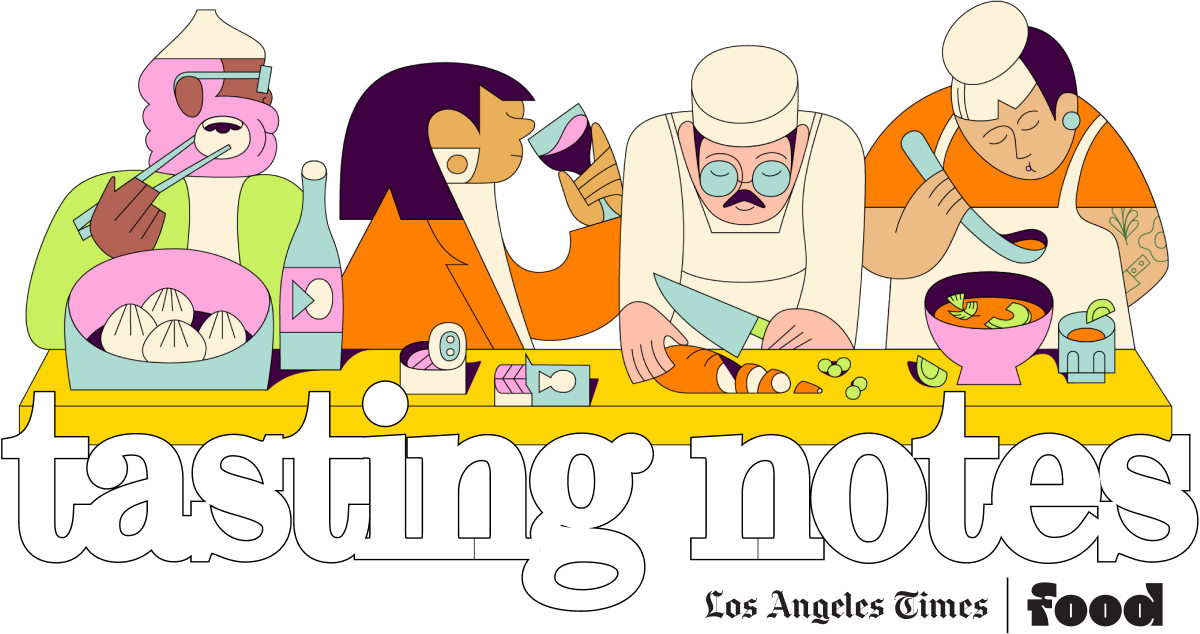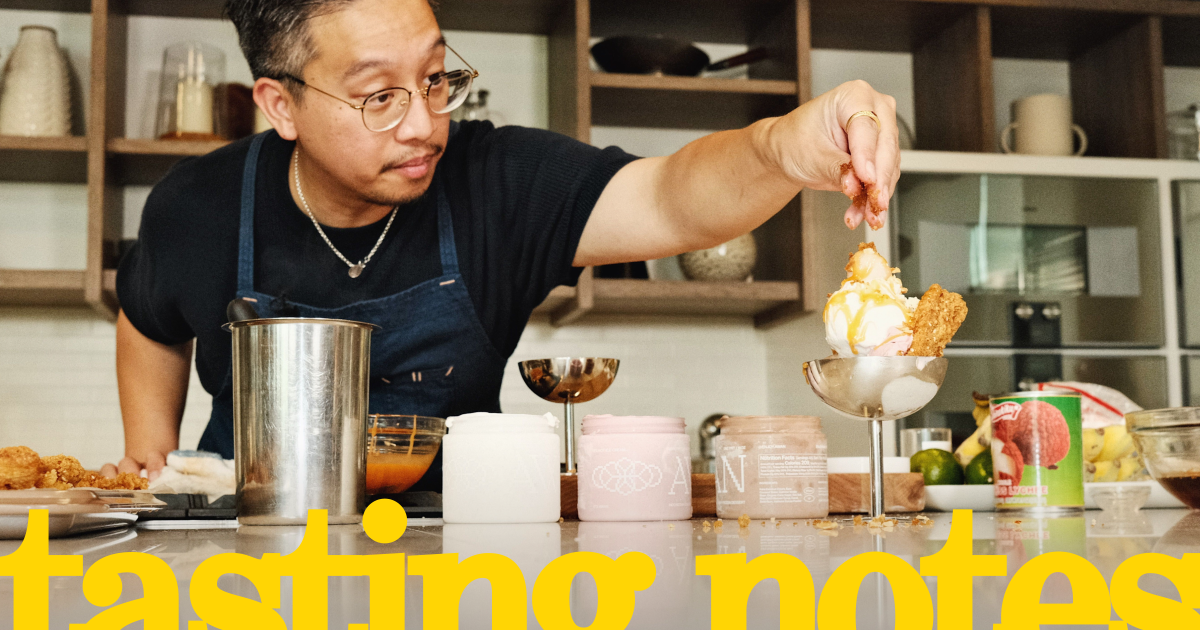How chefs think different. Also, a “Mean Girls” food crawl, Koo Koo Roo’s return, micheladas and nachos at the new Sonoratown Cantina, great recommendations for Sunday brunch and grab-and-go picnics, plus how not to freak out over the changes at the growers of Koda Farms rice. I’m Laurie Ochoa, general manager of L.A. Times Food, with this week’s Tasting Notes.
Cook different
Chef Justin Pichetrungsi prepares his rendition of an ice cream sundae with Thai tea caramel at the Los Angeles Times test kitchen.
(Stephanie Breijo / Los Angeles Times)
What’s the difference between a chef and a home cook? That’s a question that is obvious on one level but more complicated when you give it more than a passing thought. Over the past few months we’ve had several Los Angeles chefs in our Times Test Kitchen for a new video series we’re calling “Chef That!” As in “chef that ice cream sundae.” Or “chef that grilled cheese sandwich.” The assignment: to demonstrate a dish that is simple enough for a home cook to accomplish with ordinary kitchen equipment but also gives us a glimpse into the priorities and creative forces that shape each chef’s menu — and the way we eat.
I’ve learned a lot watching how these chefs work and think. Many times I’ve thought of those old Steve Jobs’ “Think Different” ads for Apple and the narrator’s line: “They’re not fond of rules and they have no respect for the status quo.”
This certainly applies to the chef in the first video we released this week. Justin Pichetrungsi, the second-generation chef and co-owner of his family’s Sherman Oaks Thai restaurant Anajak Thai, is no stranger to our Times food coverage. In 2022, restaurant critic Bill Addison singled out Anajak as L.A. Times Restaurant of the Year in part for his unconventional blending of L.A. taco culture with classic Thai cooking as it’s evolved in Southern California — plus a healthy pour of traditional and natural wine enthusiasm.
He did all this while keeping the structure of the family restaurant intact and using the outdoor alleyway, Weber grills and communal tables to create an open, sexy, “have you tried this?” environment that gets at the essence of what people love about eating in Los Angeles.
For “Chef That!” Pichetrungsi came up with his own take on an ice cream sundae. He made a caramel with Thai tea, replaced sliced Cavendish bananas normally seen in banana splits with stubby Thai bananas (kluay nam wah) that he fried in a batter made with desiccated coconut, then added toasted sesame seeds to roasted peanuts for garnish. And in place of the usual cherry on top, he used peeled lychees.


Anajak Thai’s Justin Pichetrungsi uses Thai bananas for his ice cream sundae. The dessert also includes Thai tea caramel and lychees. (Laurie Ochoa / Los Angeles Times)
Oh, and because Pichetrungsi says he is “full-blown lactose intolerant,” he scooped dairy-free, plant-based vegan ice cream from Awan, founded in L.A. by Tohm Ifergan and Zen Ong.
Among the many chef’s tips Pichetrungsi shares is his L.A.-perfect technique for quickly ripening bananas or any fruit: “You put them in your hot car and you drive the car down the 405 in an untinted car and they will become ripe in no time.”
Another bit of chef wisdom: “A batter without salt is joyless.”
The sundae, partly inspired by the fried food sold by street food vendors in Thailand, is a lovely amalgamation of tradition and chef ingenuity. To go with the full video, we’ve got the recipe for the ice cream sundae and the Thai fried bananas so you can try the dessert at home, plus an outtake video with some of Pichetrungsi’s chef’s tips and his favorite kitchen knife.
Look for more “Chef That!” videos every Wednesday in the coming weeks. On deck, we’ve got Mary Sue Milliken, Jordan Kahn, Dave Beran, Curtis Stone, Brian Dunsmoor, Sean MacDonald and Jesus “Chuy” Cervantes, with many more in the works. Also note that Pichetrungsi will be serving bites of Anajak’s cuisine for VIP ticketholders at this year’s L.A. Times Food Bowl on Sept. 21 at the Paramount Pictures Studios Backlot. The full lineup was released this week and tickets will go fast.

Justin Pichetrungsi’s fried bananas work well in his Thai ice cream sundae or as a separate dessert.
(Stephanie Breijo / Los Angeles Times)
To Koda rice lovers: ‘Stop freaking out’

Robin Koda, proprietor of Koda Farms, in South Dos Palos.
(Mariah Tauger / Los Angeles Times)
Newsletter
You’re reading Tasting Notes
Our L.A. Times restaurant experts share insights and off-the-cuff takes on where they’re eating right now.
You may occasionally receive promotional content from the Los Angeles Times.
Like many lovers of Koda Farms rice, I was alarmed to find out that the family behind California’s heirloom Kokuho Rose variety, which Keisaburo Koda and breeder Arthur Hughes Williams developed 97 years ago, will no longer operate its historic South Dos Palos farm.
After all, this rice, as Times reporter Daniel Miller wrote last year in our series on Los Angeles as America’s sushi epicenter, “played a key role” during the 1960s in popularizing sushi in Los Angeles and eventually the rest of the U.S.
“There were a few things that made sushi possible — No. 1 and most pivotal was the rice,” Atsuko Kanai, whose father sold Kokuho Rose rice to L.A. restaurants, told Miller. “Koda Farms … [made] a more palatable rice that could be served in sushi.”
The survival of the medium-grain rice — a cross, David Karp (aka “the fruit detective”) wrote in 2014, between traditional short-grained Japonica rice and the Middle Eastern strain Assyrian — also represented Keisaburo Koda’s grit, determination and optimism in this country even after, as Times columnist Frank Shyong wrote this week, the family was “forced into a Colorado incarceration camp” during World War II and had to rebuild after losing the home and successful businesses they’d created.
“My grandfather, no matter how trod-upon or ill-treated, never lost his enthusiasm for America,” Robin Koda told Shyong, who only recently realized that the “imported” rice he thought he’d grown up eating in Tennessee was actually California-grown Koda rice.
So does the Koda family’s retreat from farming mean the end of Koda rice? Times Food reporter Cindy Carcamo reached out to sister-and-brother partners Robin and Ross Koda to find out.
Carcamo’s story has full details about the Kodas licensing the rights to grow Kokuho Rose rice to Western Foods led by Miguel Reyna, who is a longtime friend of the family business, and why the rice might even get better.
The story also has the best advice from Robin Koda herself for those of us who love cooking with the rice and worry about its future: “Stop freaking out. Stay calm. This is Koda family legacy chapter two. … We ain’t going anywhere.”
Quite the Koo Koo Coup
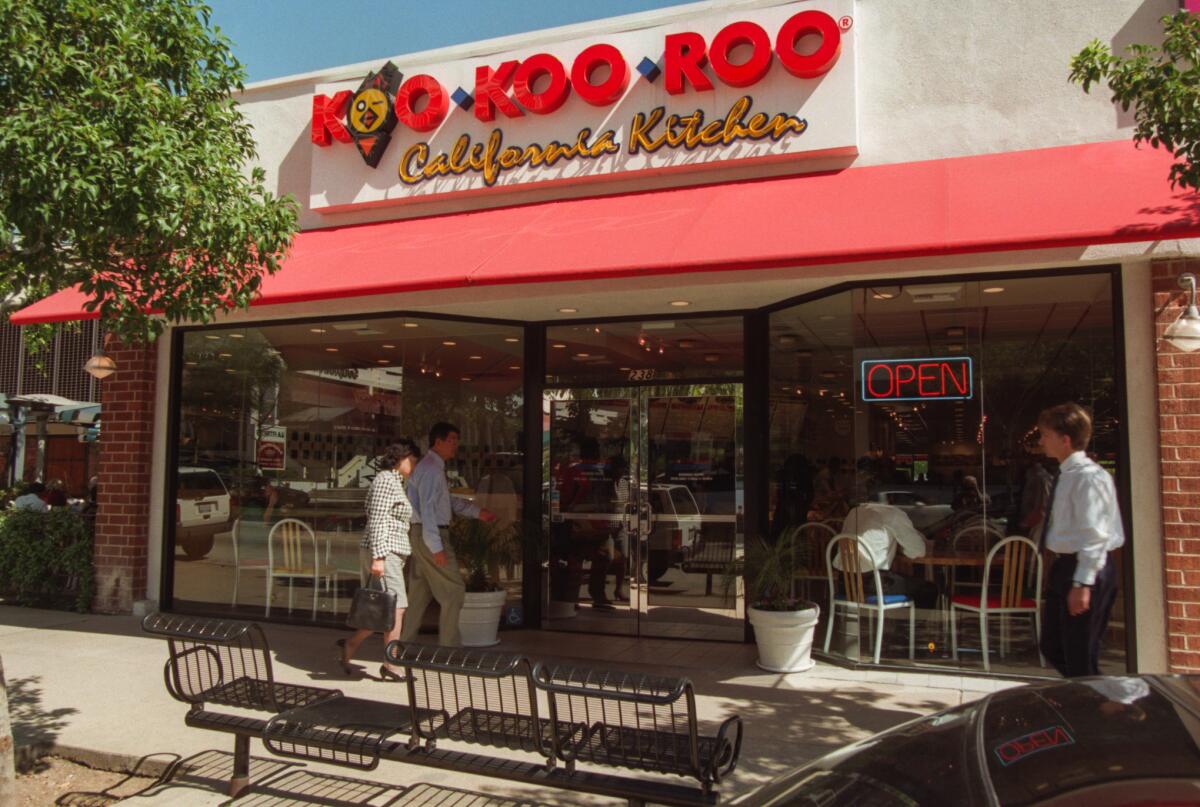
Koo Koo Roo on Pasadena’s Lake Avenue in March 1997. At one point the soon-to-be-revived chain, which closed its last restaurant in 2014, had some 40 locations.
(Perry C. Riddle / Los Angeles Times)
Koo Koo Roo, the L.A.-founded chain devoted to flame-grilled skinless chicken — and a pioneer in healthy fast fast food — is making a comeback after shuttering in 2014. Food’s Stephanie Breijo talked with new owner and chief executive Daniel Farasat.
“I’ve been very protective of the brand and making sure that we bring it back the right way,” he told Breijo. “It’s really an ode to L.A.”
A sampling of the revived Koo Koo Roo items will be previewed Oct. 5 at ChainFest, an event billed as “the world’s largest celebration of chain restaurants,” and run by, Breijo writes, “some of entertainment’s biggest names, including B.J. Novak, Chrissy Teigen and chef and culinary TV personality Tim Hollingsworth.” Backed by the formidable chef skills of Hollingsworth (who last week shared the sad news that his downtown restaurant Otium is closing Sept. 8, with hopes of reopening in a new location), the group has been creating cover band versions of beloved fast food favorites — with more attention to detail than the originals — at Chain pop ups since 2021. At the larger ChainFest, the actual chains, including KFC, Hot Dog on a Stick, Red Lobster and Trader Vic’s, will bring new or exclusive festival versions of their menu items.
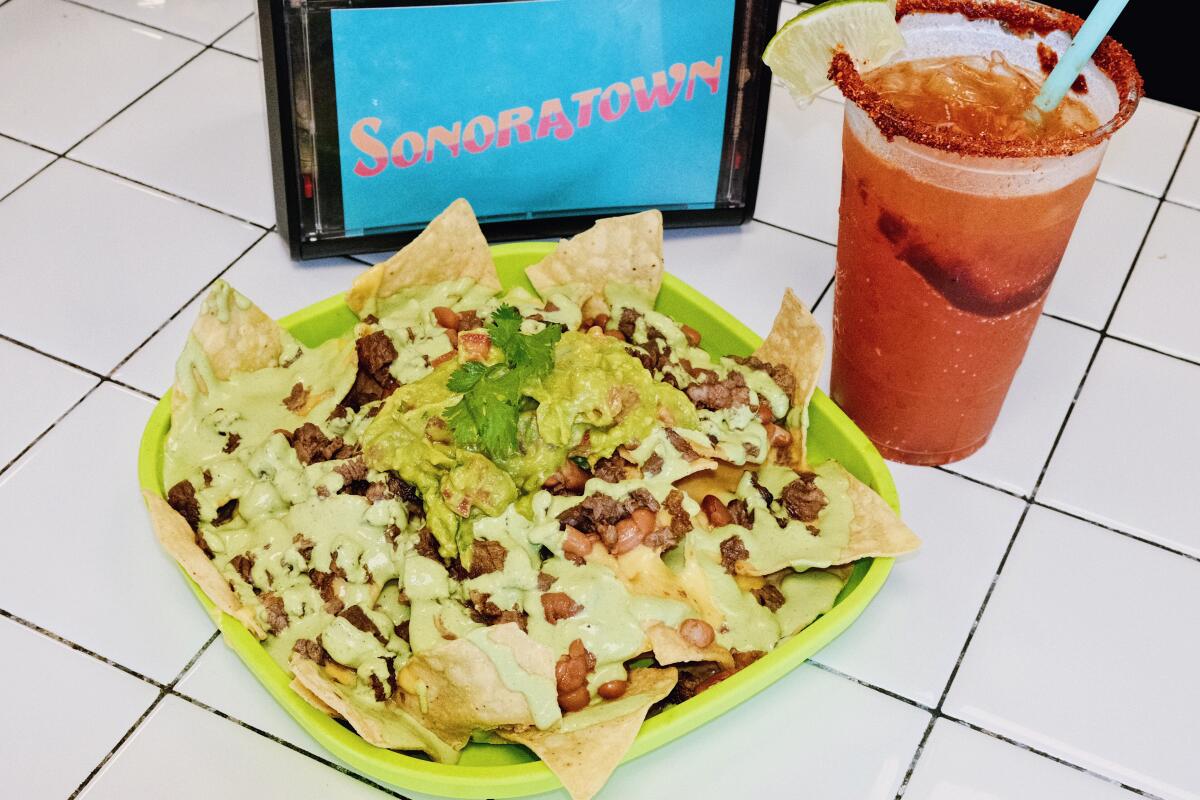
Sonoratown Cantina, attached to the Sonora-style restaurant’s Mid-City location, serves micheladas, house-made sangria and bar bites such as nachos and grilled elote.
(Stephanie Breijo / Los Angeles Times)
Breijo also talks with Jennifer Feltham and Teodoro Diaz-Rodriguez Jr. about the expansion of their Sonoratown empire, which will soon be in Long Beach. The downtown taco and burrito spot known for the excellence of its flour tortillas — it’s been a constant presence on Bill Addison’s 101 Best Restaurants in L.A. list — opened a new Mid-Wilshire location in 2022, then added a tortillería next door and now the new Sonoratown Cantina serving micheladas, sangrias and nachos covered not only in cheese but poblano-and-serrano crema. Sounds like a good candidate for our “Chef That!” series.
Even ‘Mean Girls’ have to eat
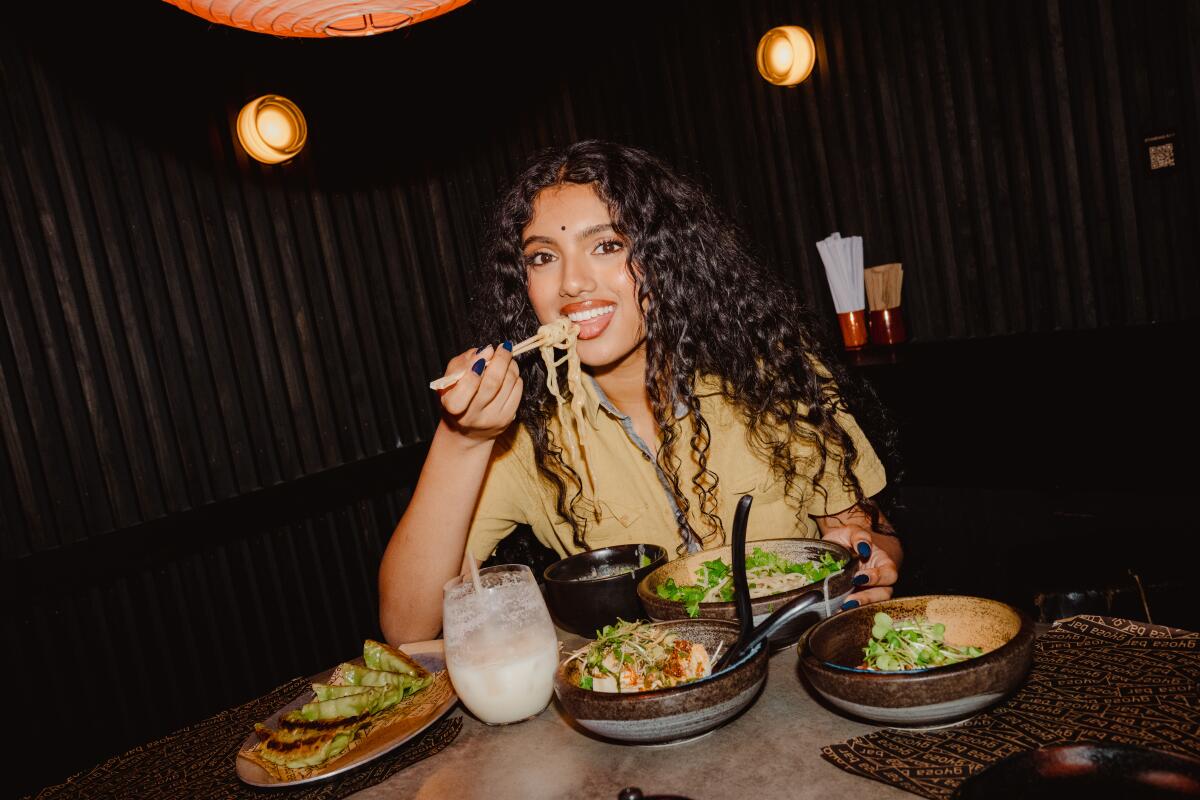
Avantika at Gyoza Bar in Echo Park.
(Jane Kim / For The Times)
In her latest edition of The Crawl, Jenn Harris eats frankies, gyoza and more with “Mean Girls,” “Big Girls Don’t Cry” and “Spin” actress Avantika (first name only, please) and talks about everything from her “budding career as a producer” (she’s sold the princess and prince story “A Crown of Wishes” to Disney) to her mom’s roti, her wish to be on a cooking show and how a bad date led to her discovering one of her favorite L.A. restaurants.
Also …
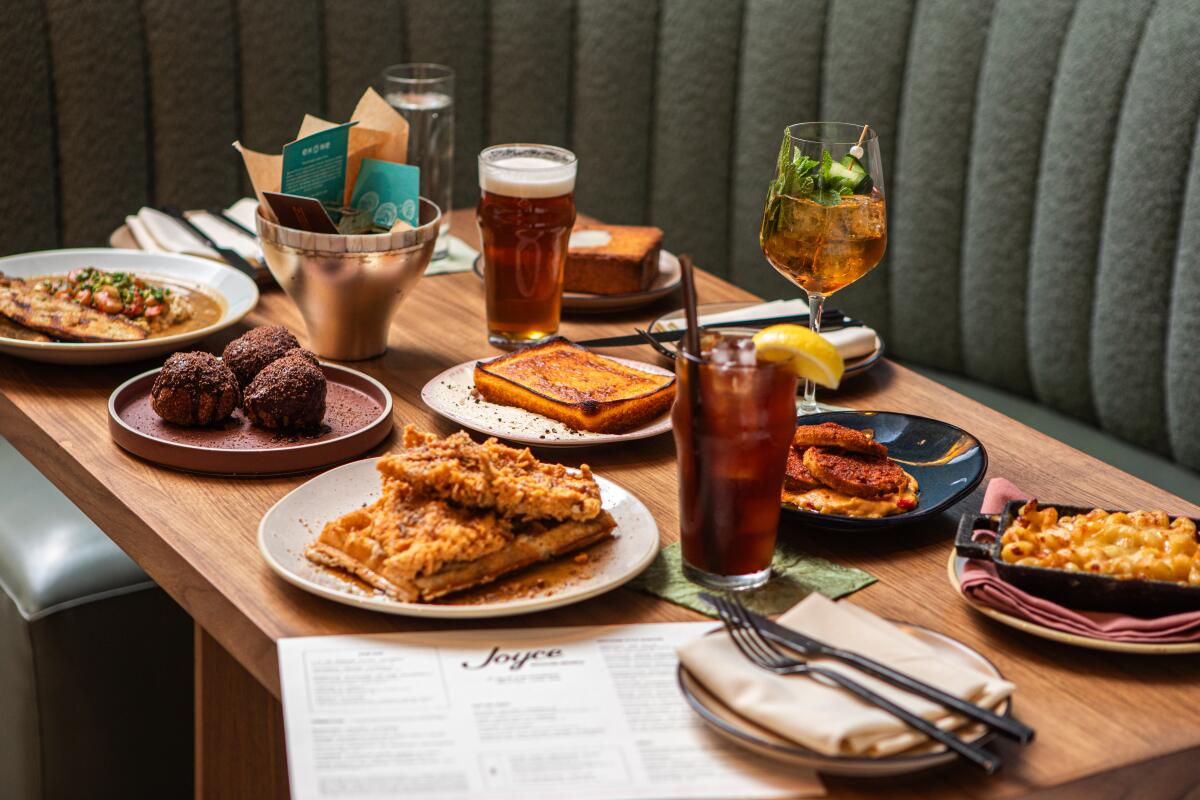
Weekend brunch spread at Joyce restaurant in downtown L.A.
(Joyce)
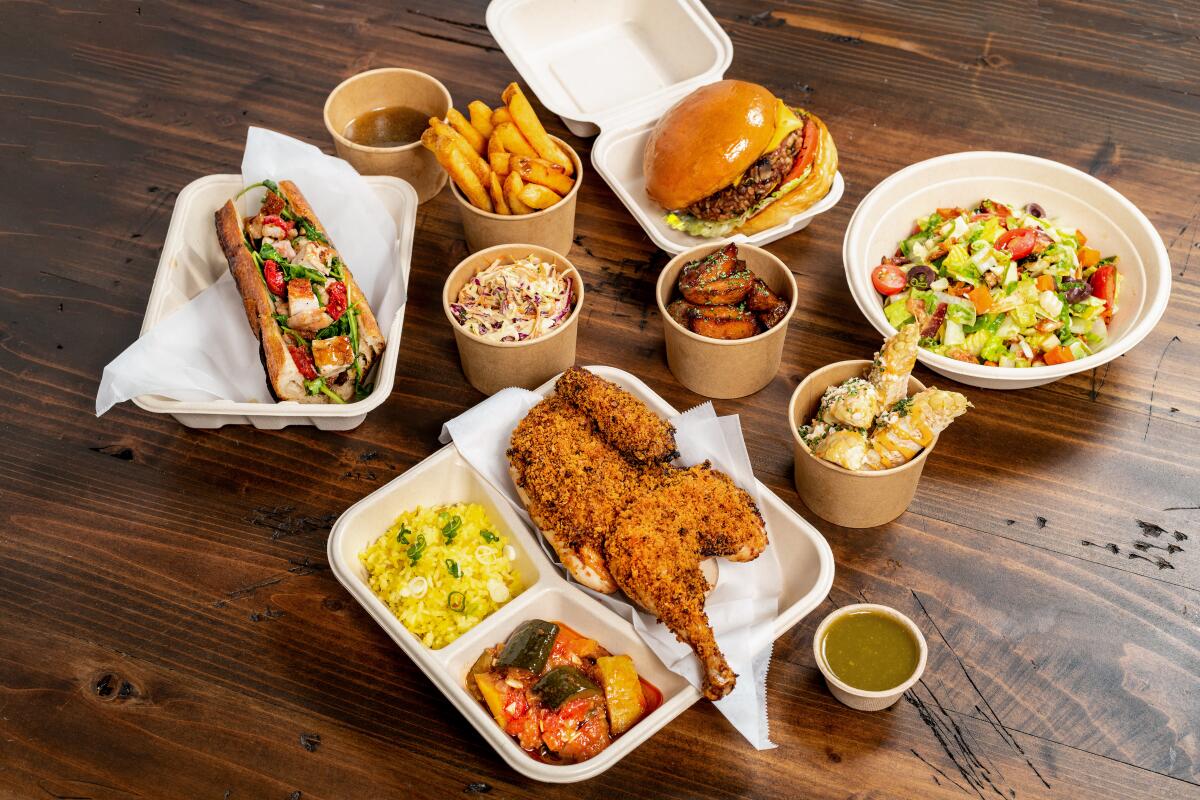
Some of the offerings at chef Josiah Citrin’s Augie’s on Main, named for his son, include “dirty” roast chicken, sandwiches, salads and sides.
(Jeff Couch / Augie’s on Main)
- And Tiffany Tsu put together a guide to “12 delicious grab-and-go picnics to pair with L.A.’s prettiest parks and beaches.”
- A woman is suing Starbucks “alleging she was scalded at a drive-through window in Lynwood,” reports Andrew J. Campa. These types of cases have continued since a jury ruled against McDonald’s in a similar lawsuit in 1994.
- Stephen Battaglio got an inside look at the country’s most exclusive pop-up restaurant, the CNN Politico Grill, where only 400 of more than 4,000 admission requests were accepted during this week’s Democratic National Convention in Chicago. High-profile politicians, journalists and celebrities were among the chosen — and contrary to Democrat’s big-tent ideals, CNN Worldwide chief operating officer David Leavy told Battaglio, “No one is allowed to bring their assistant in.” At least the food was free, and a waitress revealed that “the cook in charge of the Italian beef sandwiches was trained at Portillo’s, the Chicago-based restaurant chain responsible for many of the expanded waistlines in the city.”
- And are we headed to a Chick-fil-A and chill world? Caroline Petrow-Cohen reports that the chicken sandwich chain is planning its own streaming service and original programming, “including a family-friendly game show.”
Newsletter
Eat your way across L.A.
Like what you’re reading? Sign up to get it in your inbox every week.
You may occasionally receive promotional content from the Los Angeles Times.
